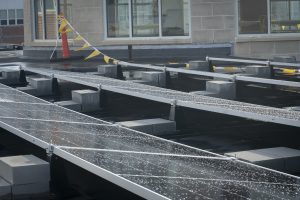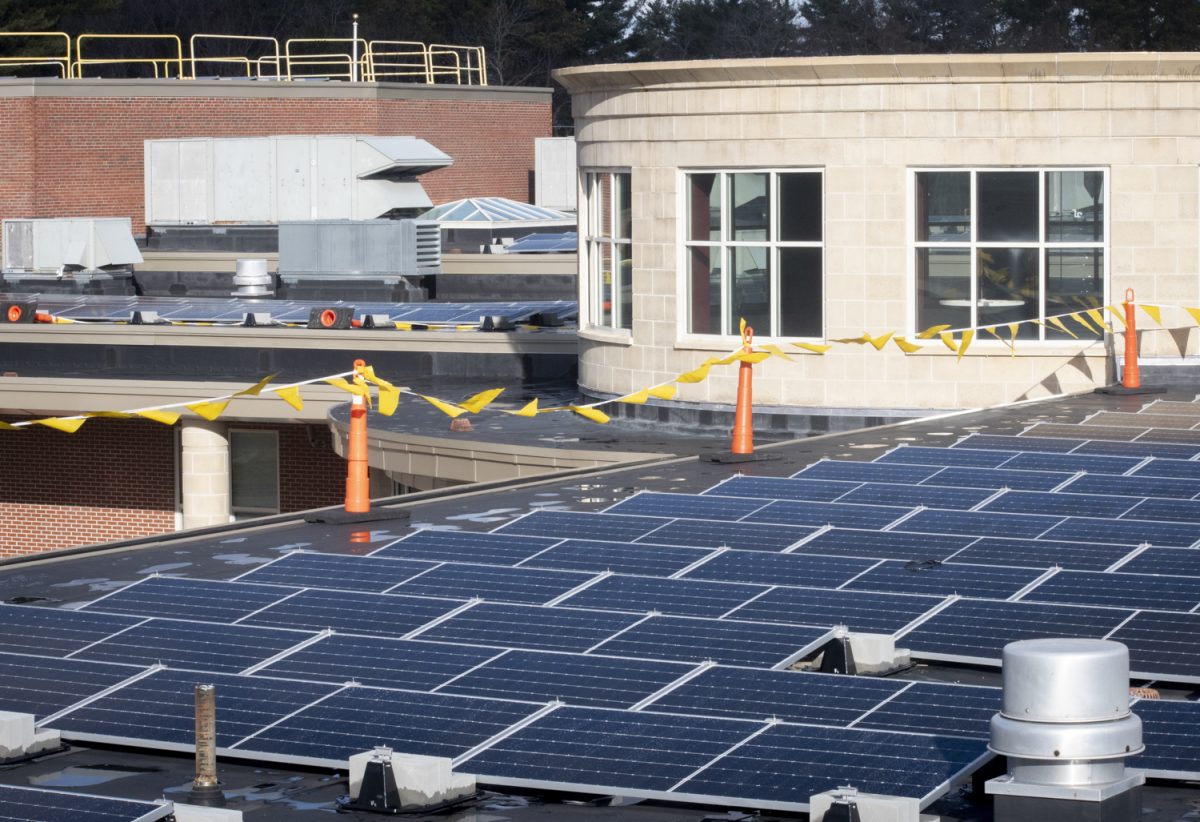With energy prices skyrocketing, the Northborough-Southborough Regional School District recently expanded Algonquin’s solar panel array to reduce costs.
In 2024, the district spent $124,000 on electricity at Algonquin. With prices rising each year due to inflation and other factors, district administrators and school building managers have worked to find ways to cut down on energy costs. One way, which is also environmentally-friendly, is through the use of solar panels.
“Municipalities and schools are usually one of the higher energy usage of a community, so when we take steps to reduce that, it’s a really great thing,” Assistant Superintendent of Operations Keith Lavoie said.
The first array of solar panels was installed on Algonquin’s roof in 2020.
“When [the initial panels were] installed, we saw a lot of benefits, which are reduced electric bills and cleaner energy,” Principal Sean Bevan said. “I think that in practical terms, it delivers monetary benefits.”
Algonquin’s Director of Facilities Mike Gorman said the monetary benefits of the additional solar panels will be significant.
“The new [solar panels] being up now are going to be 400 kilowatts and are anticipated to do somewhere around $50,000 to $60,000 savings a year of operating costs and lower our carbon footprint,” Gorman said.
According to Gorman, the district has been working on being more environmentally sustainable since 2006 with changes like implementing LED lights and turning off equipment when not in use. In order to meet Massachusetts’ carbon footprint requirements, school facilities staff have been doing all they can to reduce carbon emissions.
“By reducing the carbon footprint, what you’re doing is we’re putting less carbon up into the atmosphere, and that carbon that goes up in the atmosphere is what’s driving climate change,” Environmental Science teacher Christina Connolly said.
The district has a 20-year contract with Solect Energy to implement solar panels that generate energy for the company. Algonquin then purchases the energy at a serious discount.
Gorman explained that while solar panels have limited longevity, their ownership by Solect Energy ensures that Algonquin will not be negatively impacted.
“We believe that [it will be] up until 15 years before we start to lose the efficiency, but it works for us because we’re just buying the power,” Gorman said.
According to Bevan, Solect was chosen for doing their work both quietly and quickly, as to not impact the learning environment.
According to a Harbinger survey of 130 students conducted through Google Forms from Dec. 11 to Dec. 16, roughly 96% of students said they did not experience any inconvenience from the installations. Many survey respondents think the expansion of solar panels is a good idea.
“I think that it is worth the cost because my family has solar panels and it has significantly lowered the electric bills in my family,” a survey respondent said.
Both monetary and environmentally friendly benefits are major focuses of the students.

“I really like the idea and I think it is super cool that the school is following a more modern trend and becoming a little more environmentally friendly,” another survey respondent said.
Some survey respondents wondered about the potential pollution from making solar panels, which will eventually become waste. Others questioned the efficacy of the panels.
“[Installing solar panels] is probably not worth it because I don’t think our school building receives a lot of sunlight and solar panels are expensive and pollutive when wasted/created,” one student respondent said.
Connolly also expressed her concern that the sheer number of solar panels installed on the roofs of houses and schools across Massachusetts could lead to significant waste in the future. She believes that’s exactly why it is necessary to recycle solar panels and invent effective ways to reuse solar panels for sustainability although it is difficult and may not benefit companies.
“Recycling solar panels is expensive, but we don’t require it,” Connolly said. “So they’re not going to do it because it’s expensive. Why would they do it if it’s not going to be required?”
She thinks that Massachusetts should work on implementing new laws on the recycle and reuse of solar panels in the future.
This story was originally published on The Harbinger on January 21, 2025.




































